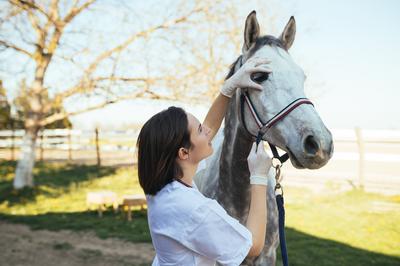Allergies are not uncommon in horses, especially this time of year, but there are options to help these horses. Allergies can affect the immune system, respiratory system, and the skin.
If not treated, allergies can affect your horse’s performance and quality of life. Some allergic reactions are evident as mild cases of hives, while severe cases can make your horse miserable.
Horse Physical Exam

Horse being examined for signs of allergies.
Dr. Samuel White of Nottingham Trent University in England states in the publication The Horse that the immune system is involved with the allergic response, and when the horse’s body is exposed to an allergen, a protein that includes antibodies called IgE is produced.
IgE binds to cells in the body and releases inflammatory mediators that cause clinical signs like itching. Horses are exposed to all kinds of allergens in the hay, and some horses react to the noxious gases from the ammonia in urine, causing an allergic reaction. These types of allergies can affect the skin or respiratory tract.
Decreasing the number of allergens to which horses are exposed can be done by removing horses from the barn when mucking out stalls. Spores from hay can travel a distance in the air, so storing hay in a different area or barn away from your horse can be helpful.
Many affected horses will cough due to mucous secretion and narrowing of the airways. Soaking hay can be helpful in reducing dust for horses showing respiratory allergies.
Skin allergies are very common this time of year due to insect bite hypersensitivity as some horses are reactive to the saliva of biting flies. Highly allergic horses may require body sheets as well as fly sprays to protect them from flies to which they may be sensitive.
Ask your veterinarian if you have questions about allergies your horse may be suffering from.